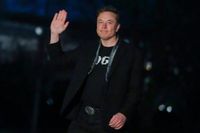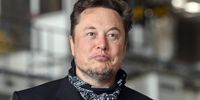SpaceX's Vision of Mars Colonization Sparks Debate and Optimism
After a successful mission to rescue NASA astronauts stranded at the International Space Station (ISS), SpaceX CEO Elon Musk has set ambitious goals for humanity's future on Mars. During a podcast with Texas Senator Ted Cruz, Musk predicted that humans could live on the Red Planet within 20 years. "You need Mars to become self-sustaining and be able to grow by itself before the resupply ships from Earth stop coming," Musk mentioned in the podcast, posted Wednesday. According to Musk, achieving this critical civilizational threshold would significantly bolster humanity's longevity.”
Musk believes a realistic timeframe for developing a Mars colony is indeed 20 years, but warned that such an enterprise would demand immense resources including a substantial population and infrastructure capable of supporting life in Mars' hostile environment. He emphasized that merely having a few individuals on the surface wouldn't suffice for sustainability: "You're going to need on the order of one million people, and a million tons of cargo."
SpaceX’s plans are not just a push for human presence on Mars but involve creating the systems necessary to support civilization. “On planet Earth, we’re at the top of a massive pyramid of industry that starts with mining a vast array of materials, which go through hundreds of steps of refinement. We grow food, trees, and make things from them,” Musk explained. “You have to build all that on Mars, which is a hostile environment.”
Crucially, Musk announced that SpaceX aims to launch a Starship to Mars in 2026, with plans for humans to follow in 2029, carrying Tesla's humanoid robots, known as Optimus. His commitment to Martian colonization has been unwavering since he founded SpaceX in 2002. Jim Cantrell, founder and CEO of Phantom Space, remarked, "The way to look at anything Elon Musk does is through the lens of Mars."
To bolster excitement for its Mars ambitions, SpaceX recently initiated a promotion during March Madness, offering a trip to Mars on a SpaceX Starship for the winner of a perfect bracket. Despite Musk's enthusiasm, skeptics argue that his vision of a self-sustaining colony on Mars is implausible. Journalist Jim Stewartson criticized the notion on social media, stating, "The only way to achieve that is by going underground. Mars is uninhabitable due to extreme radiation... it’s nothing more than a hoax to steal your money."
In stark contrast, Musk views the journey to Mars as a stepping stone to broader cosmic understanding. During the podcast, he articulated his curiosity-driven philosophy, saying, “I want to understand the universe, which requires exploring other planets, star systems, and galaxies.” He envisions that such explorations could lead to discovering alien civilizations or the remnants of those that once existed, thus shedding light on profound questions about our universe.
Yet, Musk's pursuit of a Martian future faces setbacks. Earlier this year, SpaceX experienced an in-flight failure that destroyed one of its Starship prototypes over the Turks and Caicos Islands, a temporary setback that Musk has acknowledged. On the international front, Musk's plans may depend on continued support from the U.S. government. Recently during a conference in Moscow, Russian special envoy Kirill Dmitriev expressed interest in collaborating with Musk to strengthen Russia’s space agency, Roscosmos.
Meanwhile, Musk’s ambitions are not confined to outer space ventures alone. SpaceX is also placing significant investments in Vietnam, committing $1.5 billion to expand its Starlink satellite services and support the country's digital transformation. Suppliers, like Wistron NeWeb Corporation, are also placing their bets in Vietnam, adding another $30 million into operations aimed at enhancing local manufacturing capabilities.
As Vietnam emerges as a hub for high-tech investments, these moves highlight SpaceX's strategic commitment to the region. With over 1,500 villages in Vietnam lacking reliable internet access, SpaceX’s Starlink could provide crucial connectivity solutions to underserved areas. Vietnamese Prime Minister Pham Minh Chinh has pushed for expedited regulatory approval for Starlink, which aims to bridge Vietnam’s digital divide.
According to SpaceX's Vice President Tim Hughes, the company's extensive satellite deployment, which has already seen 6,000 satellites launched, seeks to cover nearly the entire globe. The collaboration will also enable Vietnamese residents and businesses to gain access to faster and more reliable internet connectivity, as stated by the Prime Minister’s directive to accelerate the approval process.
In a separate report, Wistron NeWeb’s expansion in Ha Nam Province, which covers 11.3 hectares, indicates an overall shift in production strategies as companies respond to evolving market demands. Such investment patterns show a burgeoning confidence in Vietnam's potential to emerge as a key manufacturing hub for advanced technologies, signaling the ongoing reshaping of global supply chains driven by companies like SpaceX.
In terms of infrastructure, SpaceX must navigate Vietnam's regulatory landscape to ensure compliance with the nation’s telecommunications laws. Under current regulations, companies looking to provide satellite internet must partner with a local telecommunications firm to operate legitimately.
Moreover, the Ministry of Information and Communications has recently proposed draft regulations to support improved foreign satellite services, potentially allowing Starlink to gain a foothold in the fast-growing southeast Asian market. This policy shakeup is part of Vietnam's effort to enhance its technological landscape while balancing trade relations with nations like the United States.
As SpaceX ventures further into these diverse efforts, from Martian ambitions to expanding internet access within Vietnam, it faces a blend of optimism and skepticism from both the public and its competitors. Whether these bold predictions will materialize remains to be seen, but for Musk and his team, the journey is just beginning.






